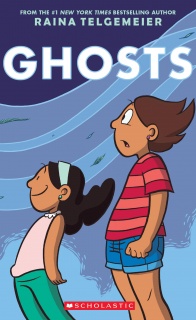Welcome back to The Rundown, our daily breakdown on comic news stories we missed from the weekend. Have a link to share? Email our team at rundown@multiversitycomics.com.

– Raina Telgemeier owns comics, enough so that her publisher, Graphix, has ordered a 500,000 first printing of her upcoming book, “Ghosts.” A quick check at the New York Times Paperback Graphic Novel Bestseller List shows half the titles are devoted to her work. In fact, “Smile” has appeared through for 211 weeks and “Drama” for 152. Expect “Ghosts” to join their ranks when it releases September 13.
– Ryan Yount has left the Stēla publishing group only four months after the app went live. The publisher specialized in comics to be read on smartphones and featured work from creators like Evan Dorkin, Ron Wimberly, and Stuart Moore. Mark Waid offered his two cents, though it’s unsubstantiated. Stēla themselves released a statement saying, “Stēla Unlimited is the first step in the expansion of the digital comics revolution that began with Stela. While the company can’t share more details about it at this time, expect to hear more about it in the near future.”
– The Book Industry Study Group plans to “offer expanded options for BISAC codes and subject headings for the kids’ graphic novel category” beginning in January 2017. These types of codes are used throughout the book industry to help categorize and shelve comics and “allow publishers to describe the content of graphic novels more precisely.” In a nutshell, this suggests the further legitimization of the medium and a desire to help improve literacy among kids with a format that’s really connecting with them.
– Last Week, The AV Club hosted their annual ‘Comics Week,’ and Caitlin Rosberg turned in this piece about how self-published comics are forcing the industry forward, despite the main corporate publishers who just want to revert back to type. Check out the comments too for some rad recommendations.
– Speaking of which! This article may be older, but the points FilmCritHulk brings up w/r/t the Marvel Cinematic Universe can easily apply with the mainstream superhero comics industry just as well. Mainly, it’s about how they never seem to want to go forward with anything, they don’t really tell stories any more, and are far more content to placate us than give us something more fulfilling.






